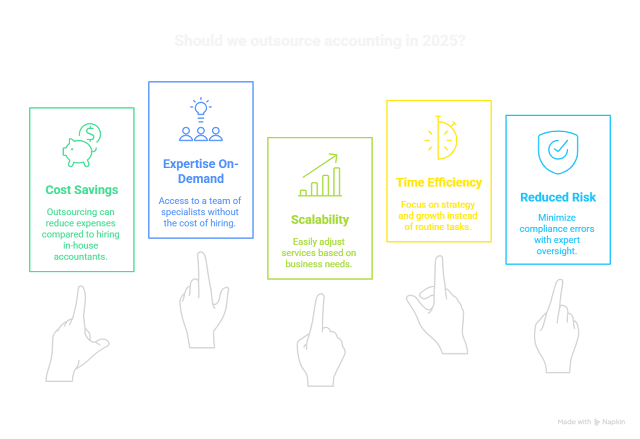 |
| Why More Businesses Are Choosing Outsourced Accounting in 2025 |
In today’s fast-paced business landscape, efficiency isn’t just an advantage—it’s a necessity. That’s why more companies are turning to outsourced accounting as a smarter, scalable solution. Whether you’re a small business or an accounting practice, delegating financial tasks to a dedicated team can save time, cut costs, and reduce stress.
Let’s explore why having your accounting outsourced might be the best decision you make this year.
1. What Is Outsourced Accounting?
Outsourced accounting involves hiring a third-party provider to handle some or all of your accounting functions—bookkeeping, payroll, VAT filing, tax preparation, and even management reporting. The service is typically delivered by trained professionals working remotely, often in offshore locations with lower overhead costs.
This approach gives businesses access to a full team of experts without the expense and complexity of in-house hiring.
2. Benefits of Outsourcing Your Accounting Tasks
-
Cost Savings: Outsourced services are generally more affordable than hiring full-time, in-house accountants, especially when factoring in salaries, benefits, and training.
-
Expertise On-Demand: Access to a team of specialists in various accounting disciplines, including UK tax regulations and compliance.
-
Scalability: Easily scale services up or down based on seasonal demand or business growth.
-
Time Efficiency: Business owners and accounting firms can focus on strategy, client service, and growth instead of routine financial admin.
-
Reduced Risk: Fewer chances of compliance errors or delays, thanks to dedicated professionals who stay updated with the latest regulations.
3. Who Should Consider Accounting Outsourced Services?
-
Small and Medium Businesses (SMBs): For those without the budget or need for a full in-house team.
-
Accounting Firms: Practices looking to reduce operational costs and increase capacity during busy seasons like year-end or tax deadlines.
-
Startups: Founders who want to prioritize business development without compromising financial accuracy.
4. Common Services Offered in Outsourced Accounting
-
Bookkeeping
-
Year-end accounts
-
Payroll processing
-
VAT returns
-
Tax preparation
-
Management accounts
-
Data migration and software support
By outsourcing these functions, businesses can ensure accuracy, meet deadlines, and free up internal resources.
5. Key Considerations When Choosing an Outsourcing Partner
-
Data Security: Ensure the provider follows GDPR and uses secure systems for data handling.
-
Experience in UK Accounting: The partner should have a solid understanding of UK tax laws and standards.
-
Communication & Support: Clear communication channels and dedicated account managers are crucial.
-
Technology Compatibility: Seamless integration with platforms like Xero, QuickBooks, Sage, or FreeAgent improves workflow.
Conclusion
Choosing to have your accounting outsourced is no longer just a cost-saving move—it’s a strategic advantage. As competition grows and regulations evolve, outsourcing offers businesses a reliable way to stay ahead. From freeing up internal resources to ensuring compliance, outsourced accounting is a smart, future-proof solution for forward-thinking companies.

.png)



0 Comments